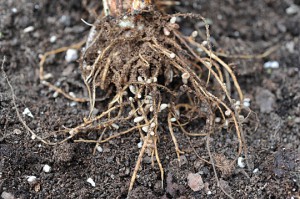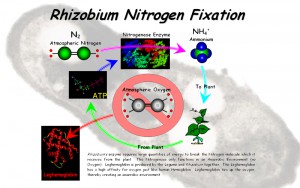Rhizobium is a genus of Gram-negative soil bacteria that fix nitrogen. Rhizobium forms an endosymbiotic nitrogen fixing association with roots of legumes and Parasponia.
The bacteria colonize plant cells within root nodules; here the bacteria convert atmospheric nitrogen to ammonia and then provide organic nitrogenous compounds such as glutamine or ureides to the plant. The plant provides the bacteria with organic compounds made by photosynthesis.
Rhizobium forms a symbiotic relationship with certain plants such as legumes. The Rhizobium fixes nitrogen from the air into ammonia, which acts as a natural fertilizer for the plants. Current research is being conducted by Agricultural Research Service microbiologists to discover a way to utilize Rhizobium’s biological nitrogen fixation. This research involves the genetic mapping of various rhizobial species with its respective symbiotic plant species, like alfalfa or soybean. The goal of this research is to increase the plants’ productivity without using fertilizers.






